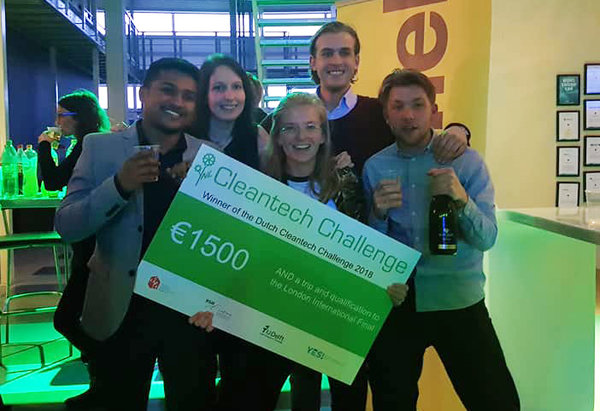IE student wins Dutch Cleantech Challenge

Sachithanandha Sundaram is a student of the Master Programme Industrial Ecology. Recently he participated with his team in the Dutch Cleantech Challenge. They presented an innovative idea to create a wood-like material made from coconut husk. This month, he will be travelling to London to present his idea in the International Cleantech Challenge finals.
What is the Cleantech Challenge?
The Cleantech Challenge or Sustainable Business Game is part of an elective course that I took in my Master Programme Industrial Ecology. The course is a collaboration between TU Delft and Rotterdam School of Management and it is organized by the Centre of Innovation Rotterdam and YesDelft. During the course, my team and I had two months’ time to come up with a business model which involves a Cleantech or a sustainable innovation. During the development process, we repeatedly got feedback and did a lot of pivoting on our ideas. Additionally, we had lectures every week in which we learned about sustainable innovation and business models.
What is the innovation you came up with?
We thought about a wood-like material made of coconut husk. This project was earlier developed by researchers from Wageningen University, but due to technical feasibility it did not reach the stage of implementation. We thought about how to use the coconut husks and improve the properties of the material to make it stronger. The professor of Wageningen University who was involved in the development of this material supported us and still supports us in the additional developments.
What is the use of the material?
It is an alternative to Medium Density Fiberboard (MDF). For example, you can make furniture, cups and bowls out of it. There is a threefold added value of producing this material from coconut husk. Coconut hulls are normally considered waste materials in Asian countries. Often they are burned, therefore CO2 is emitted. Additionally, when the material is dumped on open site potassium is leached to the ground when it rains. We thought about a solution that can turn this waste into a useful product and prevent environmental leaching. Also, it is a sustainable alternative to wood. During the manufacturing process we do not use any glues or other chemicals which they use in the production of MDF and other boards. Furthermore, we give an opportunity to the farmers of coconut trees for additional income.
How did the challenge go?
We had to pitch our idea for eight minutes to the jury during the Dutch finals, which took place at YesDelft. Eventually, we were selected as one of the teams that will go to the finals of the Cleantech Challenge in London!
What are the next steps for the project?
We are talking with several companies at the moment. Also, big ones! They might be interested in applying the materials for furniture making and other 3D objects. So I am definitely planning on taking it forward.
What would you like to tell your fellow and future students after this experience?
I would advise my classmates and friends to take an entrepreneurship course as an elective! The world in the classroom is quite different from the world outside. It is very valuable to learn about the perspective of businesses. Knowing how organizations work and what the different actors value is vital for the success of a project like this. Additionally, the group process is very valuable. Working with people from different backgrounds is a great learning opportunity. For example, my teammates from Erasmus University taught me about the financing of the project, which we, as technical students, might be thinking a bit less about!
Awesome, thank you and good luck during the finals in London!
Thanks!